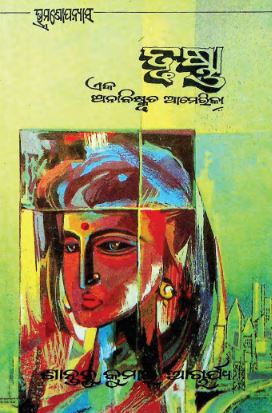In the vast realm of Odia literature, few works encapsulate the essence of human desire, cultural exploration, and emotional depth as vividly as Santanu Kumar Acharya’s novel “Trusna,” published in 1999. This novel, resonating profoundly with readers, serves as both a gripping narrative and an insightful travelogue that explores the intricacies of life in America, and the yearning (the meaning of “Trusna” in Odia) that compels individuals to seek belonging and purpose.
At the heart of “Trusna” lies the protagonist’s journey—not just through the geographical expanses of America but also through the emotional and psychological landscapes that define human experiences. Acharya’s writing immerses readers in the nuances of his characters’ lives, weaving a compelling tapestry of aspirations, challenges, and the inherent longing for connection. The narrative seamlessly transitions between vivid depictions of American life and the rich cultural backdrop of Odisha, making it a unique cross-cultural exploration.
One of the novel’s strengths is its capacity to reflect the immigrant experience. Through the eyes of its main character, who navigates the vast, bustling cities and serene landscapes of America, the story captures the duality of the immigrant experience: the excitement of new beginnings intertwined with the haunting nostalgia of one’s homeland. Acharya poignantly illustrates the isolation that often accompanies such transitions, rendering a profound portrait of the struggle to forge identity in a foreign land while nurturing ties to one’s roots.
The novel is rich in landscapes, both physical and emotional. The stunning imagery of the American countryside juxtaposed against the familiar sights of Odisha creates a powerful sense of place, evoking the beauty and complexity of both cultures. Acharya’s descriptive prowess invites readers to visualize the sprawling highways, quaint towns, and the vibrant pulse of urban life, allowing them to travel alongside the characters. With every chapter, the reader becomes a part of the unfolding journey, feeling the ache of homesickness and the thrill of discovery.
“Trusna” extends beyond a mere story of migration; it delves deeper into the philosophical musings of human desire. Through the protagonist’s eyes, we explore universal themes of love, hope, and the pursuit of happiness. Acharya’s nuanced portrayal of relationships provides insight into how bonds are forged across cultural divides, yet also highlights the inherent fragility of such connections. The emotional depth he brings to his characters fosters empathy, making readers reflect on their own relationships and aspirations.
Moreover, Acharya employs a lyrical prose style that engages and captivates the reader. His ability to infuse the narrative with Odia cultural elements—be it traditional festivals, familial bonds, or the rich tapestry of local myths—reinforces the importance of cultural identity even in the midst of change. This careful balance between the old and the new, the known and the unknown, enriches the narrative, prompting readers to consider their own journeys of self-discovery.
In conclusion, Santanu Kumar Acharya’s “Trusna” stands as a significant contribution to Odia literature, resonating with anyone who has ever yearned for something beyond the immediate and familiar. It is a beautiful exploration of life’s complexities, and a tribute to the indomitable spirit of human resilience and desire, urging us all to seek, to connect, and to embrace the myriad experiences life has to offer. Through “Trusna,” we are reminded that the journey itself, fraught with longing, is as meaningful as the destination.
Books Info
| Books name | Trusna/ତୃଷ୍ଣା |
| Editor | Santanu Kumar Acharya |
| No Of pages | 308 |
| Publisher | Grantha Mandira |
| Publication | 1999 |
| Printed At | Optima Offset Printers |
| Distributor | NA |

